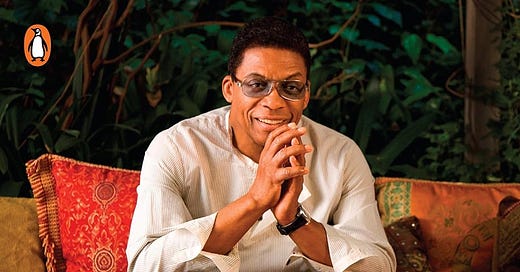Thanks to Larry Blumenfeld for asking me to write a recent cover story for Chamber Music America: “The Complete Herbie.” I love Herbie — we all love Herbie — but I haven’t written that much about Mr. Hancock so far. The commission gave me a chance to organize a few thoughts.
Larry Blumenfeld offered excellent editorial advice as well.
From the article:
…This is the Hancock that the hardcore jazz fans know and love, the benchmark acoustic pianist, revered not just for his extraordinary work with Miles Davis but also on his 1960s albums as a leader like Empyrean Isles (1964) and Maiden Voyage(1965). Of course, that work with Davis includes his participation in the trumpeter’s Second Great Quintet, from 1964-68, alongside tenor saxophonist Wayne Shorter, and Carter and Williams, which remains a lodestar in terms of modern-jazz small-ensemble interaction.
As considered from a nearly opposite angle, Hancock is one of the most brilliant hitmakers in jazz, influencing diverse generations though dance hits like “Chameleon” (from 1973’s Head Hunters, one of the best-selling jazz LPs of all time) and “Rockit” (an era-defining single from 1983’s Future Shock). A tiny bit of personal history might help contextualize this unique breadth: When I was ten years old, I watched my friends breakdancing to “Rockit” on the school playground in Downsville, Wisconsin (unincorporated, population about 140). A few years later, when I was beginning to get into jazz, I’d sit at the piano and try to learn Hancock’s voicings from Miles Davis records.
Working on the article gave me a reason to re-read Possibilities, the Hancock memoir written with Lisa Dickey.
Within in the book I found good things for both the CMA article and the recent Rhapsody in Blue essay.
There’s a lot of shared turf between Herbie Hancock and Chick Corea. In the memoir Herbie rationalizes what some said was “selling out” through his practice of Nichiren Buddhism. Chick Corea did exactly same thing with Scientology. They both firmly declare they were serving a religious higher power though reaching more people by playing more accessible music.
In terms of true jazz within the soundtrack to a major movie, the score to ‘Round Midnight stands in a luminous class of one. Possibilities includes an amusing anecdote about Hancock’s work on the film:





As great as Dexter Gordon's performance in Round Midnight is (one of the best ever) .. I feel compelled to say the Hancock score and ending concert is just too out of place in a movie dedicated to Bud Powell and set in the 50s.. Ive heard stories that Barry Harris almost got the gig..can you imagine? that would've made alot more sense at the time.. no undue disrespect just sayin..
Excellent article for "Chamber Music America"! Thanks for sharing, Ethan!